 Your new post is loading...
 Your new post is loading...
Being a leader is exhilarating, but nobody said it was easy. When we can share our triumphs and learn from our failures, we’re on the road to being great leaders. Learn from those who have been there by visiting these blogs — you’ll find yourself bookmarking more than just a few
These days, you're urged to "follow your passions" and "lean in"—but what if you’re not sure where your particular passion lies? What if you don’t know which way to lean?
The following is the second in a three-part series of postsadapted from Warren Berger’s new book, A More Beautiful Question(Bloomsbury), for which he spoke with top designers, tech innovators, entrepreneurs, and leading creative thinkers to explore the art (and innovative potential) of asking the right questions.
This can be an issue not only for those starting out in a career, but also for some who are established, even highly-successful, yet unfulfilled. It’s easy to find oneself on a path determined by others, or by circumstance (i.e., the job offer or project that comes along unexpectedly and is too good to turn down, then becomes a career).
Whether you’re starting out or considering a possible change in direction, asking yourself the right questions is critical. The following eight—shared by a noteworthy lineup of entrepreneurs, innovators, consultants, and creative thinkers—can help you figure out where your heart lies and what you really ought to be doing....
When I was in graduate school, I took what I thought was going to be a “filler” type of class in Business Leadership. It turned out to be one of the most interesting classes I have ever taken and it set in motion a life-long study of what it means to be a leader.
The shrill, noisy, and extemporaneous nature of the social web is not exactly an ideal environment for the traditional notion of leadership. I’ve been thinking about this a lot and have listed below a few ways I believe social media presents challenges for leadership....
...So we set out to remake our “play it safe” culture and empower our people to think bigger and act more boldly. We made “courage” one of our core values and built a new performance management system that encourages employees to take responsible risks and set ambitious goals. People now own the outcomes they deliver, and we reward those whose contributions have an exceptional impact.
Cultural values have to be modeled at the top to take hold, so we revamped our leadership team with courage in mind. Virtually everyone on the team is either new to his or her role or new to Campbell since I became CEO....
Marc Andreessen is able to explain himself so well that I should have less commentary to add to the quotations in this post than usual. But where is the fun in that?
My primary task with this blog post has been assembling the quotations and placing them in an order which flows well, since understanding the earlier topics helps the reader understand ideas which come later in the list. Each set of quotations is a mash up from sources like the links identified in the notes at the bottom of this post....
Why do some companies achieve things that completely exceed our expectations, defying all our assumptions for what's possible?
This is a question that Simon Sinek asks the audience as he begins his famous Ted Talk. Sinek, a bestselling author and INBOUND 2014 keynote speaker, set out to discover why companies like Apple have been able to achieve such extraordinary success, while others with the same resources have failed.
He explains it through his idea called "Start With Why." And as it turns out, his findings have important implications for inbound marketers too....
Lessons learned in five years of entrepreneurship...
... The turning point for me was realizing that my blog drove my business. The more effort I put into the blog, the more my business grew. Building a portfolio of quality content and an engaged audience led to an opportunity to write a book, which led to speaking and larger assignments.
The business I have today looks nothing like the business I started. Why?...
B2B marketing strategies are having to constantly change and adjust in the light of new trends driven by B2B buyers and technology. We have identified the key B2B marketing trends and how they may shape your future strategy. To keep this article short, as there is a lot to cover, we have put in links to more detailed articles as appropriate, should you want to read further.
Typically B2B marketing is segmented into outbound marketing such as email campaigns and inbound marketing such as SEO, social media and content marketing. The general shift has been towards inbound marketing as buyers increasingly manage the early stages of the buying process without contacting vendors by reviewing websites, talking to peers in the industry and reviewing resources. This allows them to often filter and shortlist without ever talking to a sales rep....
Is the CMO’s role still about marketing? I got to thinking about this recently after reading a Forbes article about the emergence of the “Eclectic CMO.” In short, this refers to a marketing leader who doesn’t have the traditional marketing pedigree or resume.
In the past, marketing was about the four Ps. Today, marketing strategy is about delivering smart content to help leaders innovate and grow their businesses. Audience fragmentation, social media and, more recently, Big Data, have changed the rules of content marketing. In sharp contrast with the strategies of a few years ago, influencer engagement and a solid mobile strategy are now emerging as the keys to success in this arena.
This revolution has opened unconventional paths to the CMO role. As a result, companies are hiring CMOs with more diverse sets of credentials, skills, and experiences.If you’re wondering what it will take to lead marketing into the future, keep your eyes peeled for professionals who fit into these five personas...
Just read Elon Musk's writing to understand how this leader communicates...
There's no shortage of reasons to call Elon Musk a badass. He's super-successful. He has a company that does private rocket launches that look like something approaching magic. He's made the best car of all time, according to Consumer Reports. And the latest news is that he's made the safest car of all time, as well.
Here's another thing about him that goes overlooked: He's a tremendous communicator, on par or possibly better than Steve Jobs. Because while Steve Jobs was talking about the magic of gadgets, Musk is actually communicating about engineering concepts, which fly above most people's heads....
Is your thought leadership strategy using research wisely? It's not about proving your intelligence to customers, but rather about moving beyond "showing off" and actually providing something of value...
According to CMI, 57 percent of marketers feel publishing original research is an effective content tactic. But let’s be frank, much of what passes for “research” is just a small cut above a Survey Monkey experiment led by your summer intern (no offense to hard-working summer interns).
Tellabs happens to do original research well. Really well. And George Stenitzer, CMO of Tellabs, did not disappoint when we asked him to talk about Tellabs’ success using original, robust original research as part of its thought leadership strategy....
CEOs often are in the dark as to whether their people truly understand their vision. It's a dangerous place to be, and it's a difficult situation to diagnose and address....
When you step on stage at the company meeting, are those smiling, nodding heads really absorbing the new company vision and goals for the year? According to a recent Harvard Business Review article, “When CEOs Talk Strategy, Is Anyone Listening?” only a fraction of our workforce is really clued in.
The article cites recent research which says that even in high-performing companies with “clearly articulated public strategies,” only 29% of their employees can correctly identify their company’s strategy out of six choices.This is not the strategy du jour. This is your company’s core, single most important strategic statement – a definition of why the business exists and why it’s worth investing in for the future. That means 70% (7 out of 10) of all employees (yes, even yours) are unknowingly misaligned with your company’s strategic direction....
Businesses can no longer afford to have top leaders sit on the social media sidelines, a new study finds.
More than three-quarters of executives worldwide believe it is a good idea for CEOs to participate in social media, the research from public relations firm Weber Shandwick and research partner KRC Research found. The study identified a wide array of benefits that come with top executives who are socially active online.
More than 70% of those surveyed said CEO sociability increases information-sharing throughout the business, improves company reputation, demonstrates innovation, humanizes the company and improves business results....
|
The phrase "talk is cheap" is old, and in leadership roles, talk is particularly cheap.
It is easy to make pronouncements about directions and vision. For people to trust what you say, though, it is important to recognize that you communicate in three ways: through what you say, what you do, and what you reward. And each form of communication on this list is more important than the last....
There is famous and there is famous to the family. Cousin Aaron is famous to my family. Or, to be less literal, the family of people like us might understand that Satya the milliner or perhaps Sarma Melngailis or Peter Olotka are famous.
And famous to the family is precisely the goal of just about all marketing now. You don't need to be Nike or Apple or GE. You need to be famous to the small circle of people you are hoping will admire and trust you. Your shoe store needs to be famous to the 300 shoe shoppers in your town. Your retail consulting practice needs to be famous to 100 people at ten major corporations. Your Wordpress consulting practice needs to be famous to 650 veterinarians or chiropractors. Famous the way George Clooney and George Washington are famous, but to fewer people.
By famous, I means admired, trusted, given the benefit of the doubt. By famous, I mean seen as irreplaceable or best in the world.
Here's how to tell if you're famous: If I ask someone in your community to name the person who is known for X, will they name you? If I ask about which store or freelancer is the best place, hands down, to get Y, will they name you? If we played 20 questions, could I guess you?
Being famous to the family is far more efficient than being famous to everyone. It takes focus, though.
How do top business leaders spend their time?
Being fascinated by this topic, I collaborated with Chris Stowell, vice president of the International Center for Management and Organization Effectiveness in Sandy, Utah, to survey 267 C-level executives (all at the vice president level or higher) at Fortune 500 companies.The respondents to the email survey, completed over the past two months, came from 163 companies including Adobe, American Express, AT&T, Bank of America, Boeing, BP, Delta, DHL, Federal Express, GE, Google, HP, John Deere, Johnson & Johnson, Kelloggs, Motorola, Rio Tinto, and Twitter.
The survey research showed that the typical corporate leader wakes up at about 6:15 a.m., exercises for 45 minutes, and commutes 25 minutes each way. Every workday, he or she spends two hours and 25 minutes on email and texting, 25 minutes on strategy and planning, and 30 minutes on personal development. The infographic below, created by Stowell, my friend and a leadership-training consultant, summarizes the findings....
Nooyi says she isn't sure her daughters would say she's a good mom.
While interviewing Indra K. Nooyi, the CEO of PepsiCo, at the Aspen Ideas Festival Monday*, David Bradley, who owns The Atlantic, asked two questions that elicited as frank a discussion of work-life balance as I've seen from a U.S. CEO. Below is a lightly edited transcript. The second question was preceded by a brief discussion of Anne-Marie Slaughter's "Why Women Still Can't Have It All.".
I shared this message with Target’s team members moments ago. As I told them, the truth hurts, but it can also set you free.
To say that the last five months at Target have been difficult is an extraordinary understatement.
The data breach we suffered rocked consumer confidence and ignited a nationwide discussion about phishing, cyber-security and the realities of living in today’s data-enabled world. Thanks in large part to social media, it looks like this will have been one of the most covered business crises in American history.
And just last week, our CEO stepped down after six years in position and 35 years at Target. His departure has already spawned over 6,000 articles wondering and speculating about what happened.
You’d think that these two incidents alone would create enough pain to last a brand a lifetime but one of the most challenging things that has happened, in my opinion, have been reports, some attributed to unnamed team members, that paint a picture of a culture that is in crisis. When a recent post on a well-known blog called me out by name, it only felt right that I should respond....
IBM just released the results of a global study on how businesses can get the most value from Big Data and analytics. They found nine areas that are critical to creating value from analytics. You can download the entire study here.
The researchers identified nine levers that help organizations create value from data. They compared leaders (those who identified their organization as substantially outperforming their industry peers) with the rest of the sample. They found that the leaders (19% of the sample) implement the nine levers to a greater degree than the non-leaders. These nine levers are...
...I often feel alone when I’m not connected or that I’m missing out when I read the updates of my friends. It makes me rethink my priorities in ways that wouldn’t be the most productive…at least by yesterday’s standards. Should I have joined them? Maybe getting out would be just what I needed. Again, I know I’m not alone.
I’m not addicted. I’m not in need of a digital intervention or digital detox. I intentionally live this connected lifestyle because I find value more times than not. It’s a choice. But, still I wonder. I wonder if the value I get out of my interaction across a dizzying array of networks is right or simply right in the absence of discovering alternative value or utility....
Anita Elberse turned the long tail on its head during her keynote at the FutureM conference hosted by MITX in Boston last week. The popular professor of business administration at Harvard Business School discussed her new book, Blockbusters, which looks at what drives huge success in the entertainment industry, and how these lessons can translate to other sectors.It was a fascinating talk.
To introduce her premise, Elberse compared the strategies and results of two business leaders in the entertainment world: Jeff Zucker, as head of NBC and Alan Horn as president of Warner Bros. Elberse explained, Jeff Zucker focused on cutting spending and managing for maximum profitability across all of its programming. Alan Horn, on the other hand, had the opposite strategy: embrace risk and make a few huge bets a year.
The results? NBC fell from number one to the number four network and profits tanked. Warner Bros. experienced one of its most profitable decades under Horn’s leadership.
“The notion of smaller bets being safer is a myth,” Elberse told the audience. “It is safer to make bigger bets because they are likely to have bigger outcomes.”...
Do you have a vision of where your company will be in three years? In five? 10? Here’s a sure-fire way to get clear about the future you want.
As she works to reverse the fortunes of a failing Silicon Valley giant, Yahoo’s Marissa Mayer has fueled a national debate about the office life, motherhood, and what it takes to be the CEO of the moment.
“I really like even numbers, and I like heavily divisible numbers. Twelve is my lucky number—I just love how divisible it is. I don’t like odd numbers, and I really don’t like primes. When I turned 37, I put on a strong face, but I was not looking forward to 37. But 37 turned out to be a pretty amazing year. Especially considering that 36 is divisible by twelve!”
A few things may strike you while listening to Marissa Mayer deliver this riff, prompted by a question about how her life has changed since her son, Macallister, was born last fall. The first is that she’s not kidding about being a geek. Mayer talks about numbers as if they were people, refers casually to x- and y-axes, and drops terms like stochastic factor (it means a random distribution) in conversation. On business issues, she speaks awkwardly, piling as many likes into a sentence as Alicia Silverstone in Clueless. But when she gets on to technology, she turns effortlessly articulate.....
It’s now more evident than ever that CEOs who don’t engage in social media, may as well be conducting their business in a cave....
...CEOs and their executives ride shotgun in setting the cultural tone of the organization. Simply put, participation in social media promotes the use of social technology, which can only increase its competitive edge in adapting to technological market changes. Having a transparent and open organizational culture is imperative in establishing an effective social media strategy; it gives everyone a clear and common focus to tailor to the needs of the social consumer – a fact that escapes a lot of today’s CEOs.
BrandFog 2012 CEO Survey concerned this exact topic and reproduced some baffling results: - 82% of respondents were said to be more likely to trust a company whose CEO actively engages on Social Media. - 77% of respondents were recorded to be more likely to buy from a company whose mission and values are defined through their leaderships’ involvement in Social Media....
Intel, which became a global behemoth by making the chips that drive most of the world’s desktop computers and laptops, missed the mobile revolution. In tablets and smartphones, the company is a bit player....
The PCs-forever attitude was so pervasive that the people working on the company’s mobile-chip line, the Atom, were essentially second-class citizens, without access to Intel’s latest production technologies and the resources lavished on the Core line of PC chips and the Xeon line of server chips.
Now Intel is not just trying to catch up in mobile but also trying to leapfrog the competition. As Mr. Krzanich put it, Intel’s strategy is: “Embrace this and embrace it fast and actually move quicker and try and go ahead of this.”...
|
 Your new post is loading...
Your new post is loading...
 Your new post is loading...
Your new post is loading...















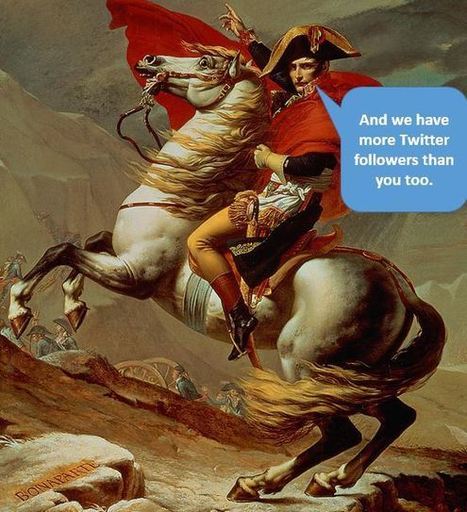

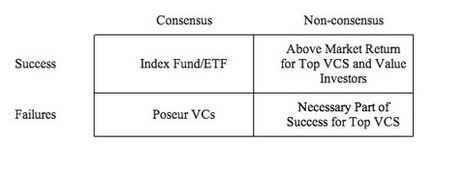
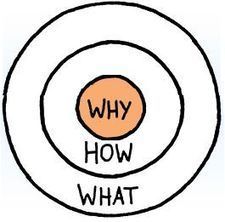






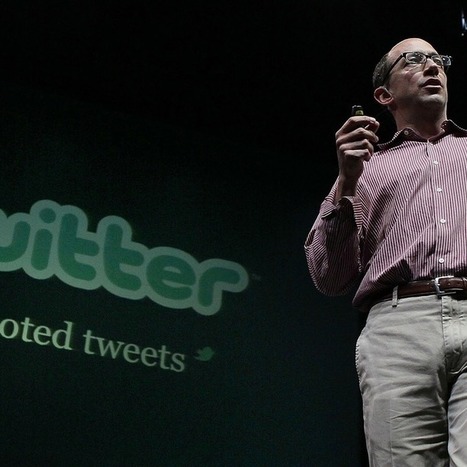





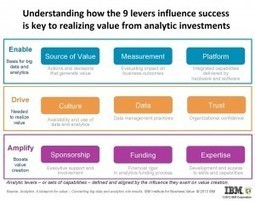
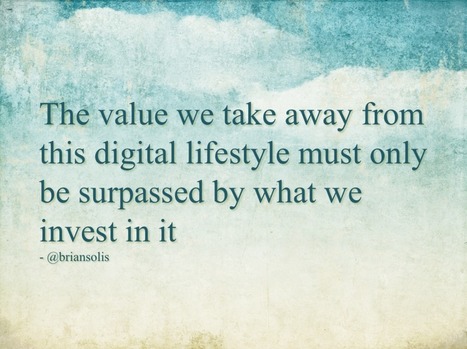
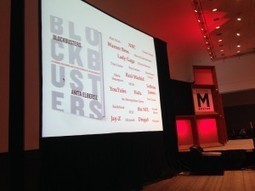











Stay on top of your game. Learn from others successes and failures.